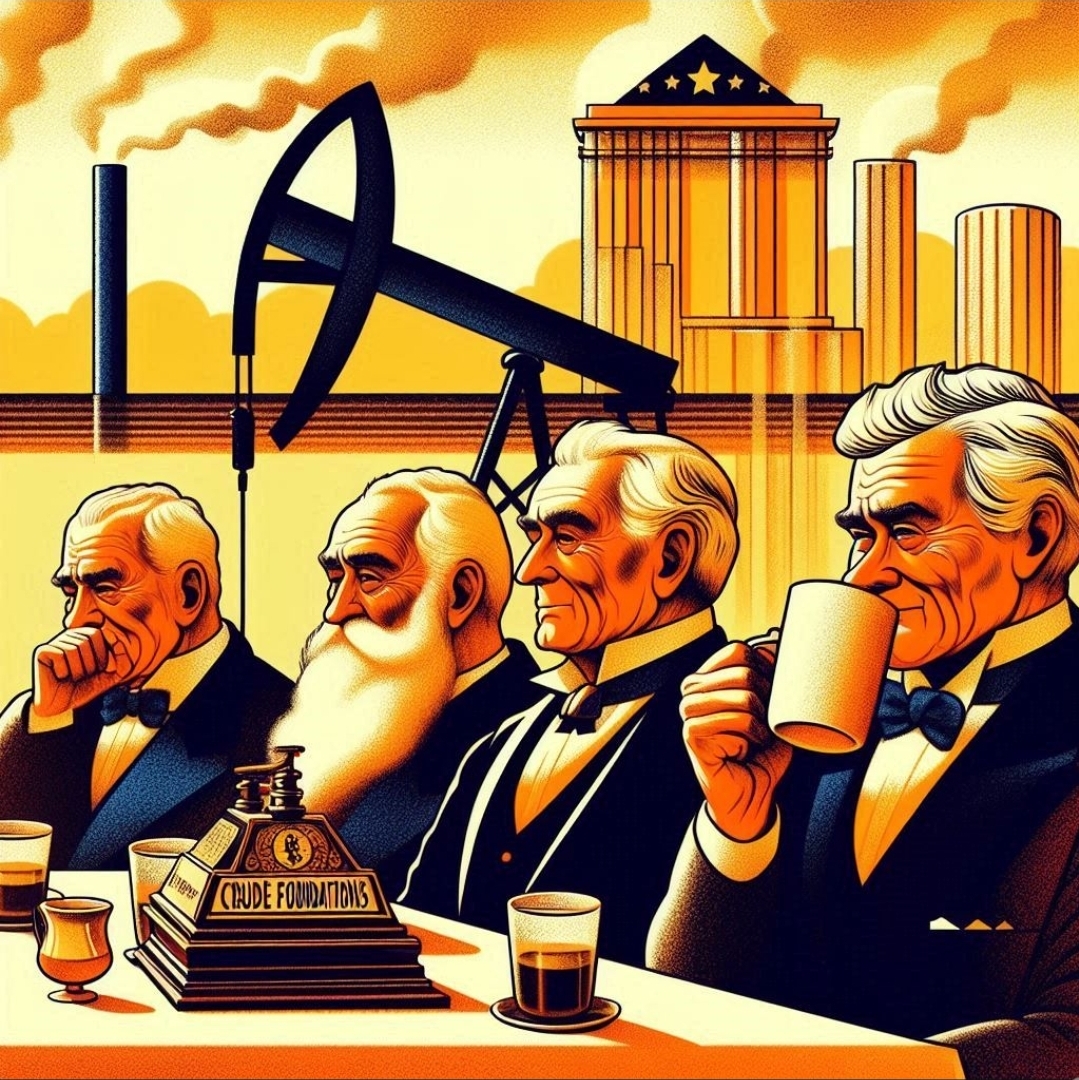Subtitle: From Black Gold to Total Control—The Engineered Rise of the Corporate State
Introduction: When Wealth Becomes Infrastructure
In the late 19th and early 20th century, John D. Rockefeller built a monopoly so vast and so powerful that it redefined not just business, but culture. Through Standard Oil, Rockefeller didn’t merely dominate the fossil fuel industry—he created a blueprint for social engineering through wealth.
Once he secured economic power, Rockefeller used philanthropy as camouflage and influence as architecture, embedding his ideology across nearly every institution in American life. What began as a quest to dominate oil became a mission to reshape society itself.
The Origin: Standard Oil and the Birth of the Monopoly Mindset
Standard Oil, founded in 1870, became the first true corporate juggernaut of the industrial age. Through aggressive buyouts, railroad price-fixing, and vertical integration, Rockefeller achieved what economists later termed a “monopsony”—control over supply, production, pricing, and even transportation.
By 1904, he controlled 91% of oil refining in the U.S.
But Rockefeller didn’t stop at petroleum. Once wealth became virtually infinite, it had to be protected, multiplied, and weaponized—and that meant entering the worlds of:
- Education
- Medicine
- Religion
- Media
- Agriculture
- Politics
Education: Training Obedient Workers, Not Independent Thinkers
As previously documented in our article Standardized Minds, Rockefeller founded the General Education Board (1902) to transform American education into a centralized obedience-training machine, modeled on Prussian schooling.
Objectives:
- Train workers to serve industrial masters.
- Replace critical thinking with standardized performance.
- Destroy localized, classical, and moral education systems.
- Promote scientism and technocratic control over philosophical inquiry.
The result: generations of citizens trained to obey bells, chase credentials, and never question systemic injustice.
“In our dreams… people yield themselves with perfect docility to our molding hands.”
—Frederick Gates, Rockefeller’s education advisor
Medicine: From Natural Healing to the Pharmaceutical Empire
Perhaps the most consequential intervention came in modern medicine.
In the early 1900s, Rockefeller sought to:
- Dismantle natural, plant-based, and holistic health systems, which were prevalent in American and indigenous medicine.
- Replace them with petrochemical pharmaceuticals, derived from oil and gas byproducts—products he could monopolize.
Step 1: The Flexner Report (1910)
Commissioned by the Rockefeller Foundation, the Flexner Report redefined “real medicine” as anything rooted in allopathy, surgery, and pharmacology.
Step 2: Shut Down Competition
- Homeopathy, naturopathy, osteopathy, and midwifery were marginalized or criminalized.
- Medical schools were shut down unless they aligned with Rockefeller-funded standards.
- AMA (American Medical Association) became a Rockefeller proxy, enforcing orthodoxy.
Step 3: Patentable Profit
Petrochemical drugs became the gold standard:
- Patentable
- Scalable
- Profitable
- Repeat-use (not curative)
This transformation laid the groundwork for today’s pharma-industrial complex, where:
- Disease management > prevention
- Symptoms > root causes
- Profit > public well-being
Religion: Moral Messaging Meets Industrial Funding
Though less discussed, Rockefeller deeply influenced American Protestantism, particularly in the early 20th century.
Example: The Rockefeller-Sponsored Social Gospel Movement
- Shifted Christian focus from personal repentance to social engineering.
- Reframed Christianity in terms of institutional “progress”, aligning it with progressive politics and industrial “order.”
His funding of seminaries (e.g., Union Theological Seminary) helped steer theological discourse away from biblical absolutism toward pragmatism, modernism, and bureaucratic Christianity.
Result: Many churches stopped challenging systems of injustice and instead became moral fig leaves for elite power.
Media: The Power to Frame Reality
By the mid-20th century, Rockefeller influence extended into publishing, news, and information control.
Foundations like:
- The Rockefeller Foundation
- Carnegie Foundation
- Ford Foundation
…collaborated to fund “independent” journalism, think tanks, and academic institutions, shaping:
- Public perception of capitalism
- Narratives around war, medicine, race, and morality
- The “Overton Window” of acceptable discourse
Media ceased being a watchdog—and became a megaphone for the new ruling class.
This soft power now functions as psychological infrastructure. As we’ve seen in The Great Conversation, the gatekeeping function of media now trains people to doubt their conscience and obey consensus.
Agriculture: From Stewardship to Industrial Control
The Rockefellers also funded the Green Revolution, often praised for increasing crop yields—but less often critiqued for its:
- Eradication of traditional farming knowledge
- Destruction of seed diversity
- Introduction of petroleum-based fertilizers and pesticides
- Consolidation of food under agribusiness corporations
By promoting chemical agriculture, they made farmers dependent on industrial supply chains—fertilizer, pesticide, seed—all controlled by allied corporations like Monsanto.
Outcome:
- Soil degradation
- Rural debt
- Health deterioration
- Food as a vector for pharmaceutical dependency
Government: From Watchdog to Lapdog
Having shaped minds, medicine, food, and morality, Rockefeller wealth turned toward policy control.
Tools of Influence:
- Think tanks (e.g., Council on Foreign Relations, heavily funded by Rockefeller money)
- University funding (Harvard, Yale, Columbia—all shaped through grants)
- Political lobbying through proxy industries (pharma, fossil fuels, defense)
Today’s revolving door between government and industry owes its origin to this strategy:
- Influence public policy via “philanthropic” institutions
- Install experts trained in Rockefeller-funded schools
- Enact laws that centralize control and dismantle local sovereignty
What This Means Today: The Corporate State as the New Monarchy
What Rockefeller built wasn’t just a monopoly—it was a cultural operating system. His money seeded institutions that:
- Trained obedience
- Shaped morals
- Defined reality
- Monetized sickness
- Centralized agriculture
- Controlled politics
He didn’t just want to own oil. He wanted to own the narrative—and through it, the future.
Conclusion: From Extraction to Awakening
The irony is this: the empire Rockefeller built from oil now burns through not only fossil fuels—but human potential.
His legacy is:
- Obedient students
- Sick patients
- Confused citizens
- Misinformed masses
- Extracted souls
But once you see it, you can choose to resist it.
You can:
- Reclaim your health.
- Relearn real history.
- Refuse to conform.
- Rethink your values.
- Teach your children truth.
Because the only thing more powerful than a monopoly is a movement of awakened people who refuse to be bought.







